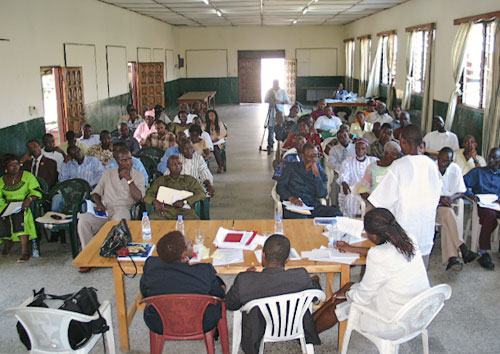The Special Court’s Defence Office, which is headed by the Principal Defender, is an innovation in the international criminal justice system. The Office acted as a counterbalance to the Prosecution, and was mandated to ensure the rights of suspects, accused person and, by extension, convicts. While other international tribunals have administrative bodies to deal with the Defence, no other tribunal had a permanent institution within the Court entrusted with “ensuring the rights of suspects and accused”, as is set out in Rule 45 of of the Special Court’s Rules of Procedure and Evidence.
The Defence Office became functional in February 2003, when its first attorneys took office. Thereafter, Legal Officers/Duty Counsel and Defence Advisors were recruited. Pursuant to Rule 45 of the Rules of Procedure and Evidence, attorneys in the Principal Defender’s Office also appeared in Court as counsel. Duty Counsel in the Office offered initial legal advice and legal representation to all accused persons, and continued to provide legal and administrative support to all accused persons and their defence teams. The Office also extended its services to convicts serving their sentences.
The first Principal Defender of the Special Court was appointed in March 2004. During the lifetime of the Special Court, the Defence Office had four Principal Defenders. The Defence Office achieved its final mandate upon the delivery of the Taylor Appeal Judgment in September 2013.
After the assignment of counsel to the Accused, members of the Defence Office engaged in oversight of defence teams. The Office monitored trials and provided advice and substantive assistance to Defence teams in the preparation of their cases, which ranged from research on legal issues as needed, working jointly on arguments on matters of common interest to the accused persons, the provision of expert witnesses, consultants and investigators, both national and international, and liaising with various governments and other entities on matters of judicial cooperation.
The Office implemented measures to attract only experienced and qualified counsel so as to ensure the accused’s fair trial representation criteria which in turn enabled all its Special Court for Sierra Leone accused persons to access their best possible defence and marshal all relevant evidence which needed to be brought to the attention of the respective Judges who were seised of their now concluded matters.
The Office maintained a list of qualified and experienced counsel willing to be assigned to indigent suspects and accused persons appearing before the Special Court. Throughout its existence, The Principal Defender’s Office interacted with different units within the Registry, OTP and Chambers, on issues affecting the rights and detention conditions of the accused or convicts . The Office also interacted on matters affecting fair trial rights of the accused, including the development of the Code of Conduct for counsel, consultations on practice directions to be adopted, assisting in making proposals for rule changes at Plenary, ensuring that the lawyer-client relationship was without issues,and providing Defence teams with support facilities. The Office also represented the interests of the Defence Office in Plenary sessions organized by the Judges of the Special Court.
The Office of the Principal Defende also liaised with the diplomatic community and NGOs in order to keep them abreast of developments within the respective cases from the beginning of each of the trials until the delivery of the Appeals Judgments.The Office engaged in outreach activities in collaboration with the Court’s Outreach and Public Affairs Section, and listened to the Sierra Leonean people and to the extent possible, answered their questions . The Office had an important role in educating the community about the Defence, the administration of the Court’s legal aid scheme, the legal principle of presumption of innocence, the burden and standards of proof, and the rights of the Accused –particularly at the community and village levels, and with national institutions such as the police and the military.
As the Court wound down its operations and achieved its mandate in Freetown and The Hague, it was envisaged that the Defence Office would provide a role model to be adopted by the Sierra Leone criminal justice system.
The Office of the Principal Defender is situated within the Registry, but enjoyed considerable independence in guaranteeing the rights of the accused.
 Claire Carlton-Hanciles (Sierra Leone), Acting Principal Defender December 2008 to October 2009; Principal Defender November 2009 to present. Ms. Carlton-Hanciles joined the Special Court in 2003 as Legal Officer/Duty Counsel in the Office of the Principal Defender. She was named Acting Principal Defender in December 2008 and Principal Defender in November 2009. From 1998 to 2003 she worked in private practice, specializing in family and human rights law. Ms. Carlton-Hanciles is a graduate of Fourah Bay College and the Sierra Leone Law School. She was called to the Bar in 1997 as a Barrister and Solicitor.
Claire Carlton-Hanciles (Sierra Leone), Acting Principal Defender December 2008 to October 2009; Principal Defender November 2009 to present. Ms. Carlton-Hanciles joined the Special Court in 2003 as Legal Officer/Duty Counsel in the Office of the Principal Defender. She was named Acting Principal Defender in December 2008 and Principal Defender in November 2009. From 1998 to 2003 she worked in private practice, specializing in family and human rights law. Ms. Carlton-Hanciles is a graduate of Fourah Bay College and the Sierra Leone Law School. She was called to the Bar in 1997 as a Barrister and Solicitor.
 Elizabeth Nahamya (Uganda), served as Principal Defender from June 2008 to December 2008, and Deputy Principal Defender for four years. Before joining the Special Court, Ms. Nahamya worked for eight years as a Legal Officer with the Chambers Division of the International Criminal Tribunal for Rwanda (ICTR). From 1995 to 1996, Ms. Nahamya was a Legal Researcher to the Uganda Constituent Assembly delegates which drafted the Uganda constitution. Prior to 1995 she worked in private practice as a defence lawyer in the Ugandan national jurisdiction. Ms. Nahamya has lectured extensively on criminal law at various universities outside her country, and has published articles on such topics as anti-corruption practices; International Criminal Law and Evidence; Criminal Law and Human Rights.
Elizabeth Nahamya (Uganda), served as Principal Defender from June 2008 to December 2008, and Deputy Principal Defender for four years. Before joining the Special Court, Ms. Nahamya worked for eight years as a Legal Officer with the Chambers Division of the International Criminal Tribunal for Rwanda (ICTR). From 1995 to 1996, Ms. Nahamya was a Legal Researcher to the Uganda Constituent Assembly delegates which drafted the Uganda constitution. Prior to 1995 she worked in private practice as a defence lawyer in the Ugandan national jurisdiction. Ms. Nahamya has lectured extensively on criminal law at various universities outside her country, and has published articles on such topics as anti-corruption practices; International Criminal Law and Evidence; Criminal Law and Human Rights.
 Vincent Nmehielle (Nigeria), Principal Defender June 2005 to May 2008. In 1990 he received his B.L. (Barrister at Law) degree from the Nigerian Law School, and was called to the Bar the same year. He received an LL.M. (Master of Laws) degree in International Human Rights Law from the University of Notre Dame Law School in 1996, and a S.J.D. (Doctor of Juridical Science) degree in 2000 from the George Washington University Law School. Mr Nmehielle has been a barrister and solicitor of the Supreme Court of Nigeria since 1990, where he practiced law in the firm of Orlu & Company, while lecturing at the Faculty of Law of the Rivers State University of Science and Technology, Port Harcourt, Nigeria. From 1998 to 2002, he served as International Law Counsel for the firm Amorrow & Kum, P.A. in the United States. Since February 2002, Mr Nmehielle has been an Associate Professor of Law at the University of the Witwatersrand in Johannesburg, South Africa. He also held the post of Professorial Lecturer in Law, where he taught at the Oxford/George Washington University Joint Programme in International Human Rights Law at the University of Oxford.
Vincent Nmehielle (Nigeria), Principal Defender June 2005 to May 2008. In 1990 he received his B.L. (Barrister at Law) degree from the Nigerian Law School, and was called to the Bar the same year. He received an LL.M. (Master of Laws) degree in International Human Rights Law from the University of Notre Dame Law School in 1996, and a S.J.D. (Doctor of Juridical Science) degree in 2000 from the George Washington University Law School. Mr Nmehielle has been a barrister and solicitor of the Supreme Court of Nigeria since 1990, where he practiced law in the firm of Orlu & Company, while lecturing at the Faculty of Law of the Rivers State University of Science and Technology, Port Harcourt, Nigeria. From 1998 to 2002, he served as International Law Counsel for the firm Amorrow & Kum, P.A. in the United States. Since February 2002, Mr Nmehielle has been an Associate Professor of Law at the University of the Witwatersrand in Johannesburg, South Africa. He also held the post of Professorial Lecturer in Law, where he taught at the Oxford/George Washington University Joint Programme in International Human Rights Law at the University of Oxford.
 Simone Monasebian (United States), Principal Defender March 2004 to May 2005. Prior to her appointment as Principal Defender, Simone Monasebian was a trial attorney with the ICTR. She was also an Adjunct Professor of International Criminal Law at the American University in Cairo, Egypt, through Seton Hall University Law School. Prior to becoming a prosecutor, Ms. Monasebian worked as a defence attorney with the Law Offices of Michael Kennedy, P.C., in New York. She is a graduate of Syracuse University College of Law and New York University.
Simone Monasebian (United States), Principal Defender March 2004 to May 2005. Prior to her appointment as Principal Defender, Simone Monasebian was a trial attorney with the ICTR. She was also an Adjunct Professor of International Criminal Law at the American University in Cairo, Egypt, through Seton Hall University Law School. Prior to becoming a prosecutor, Ms. Monasebian worked as a defence attorney with the Law Offices of Michael Kennedy, P.C., in New York. She is a graduate of Syracuse University College of Law and New York University.











